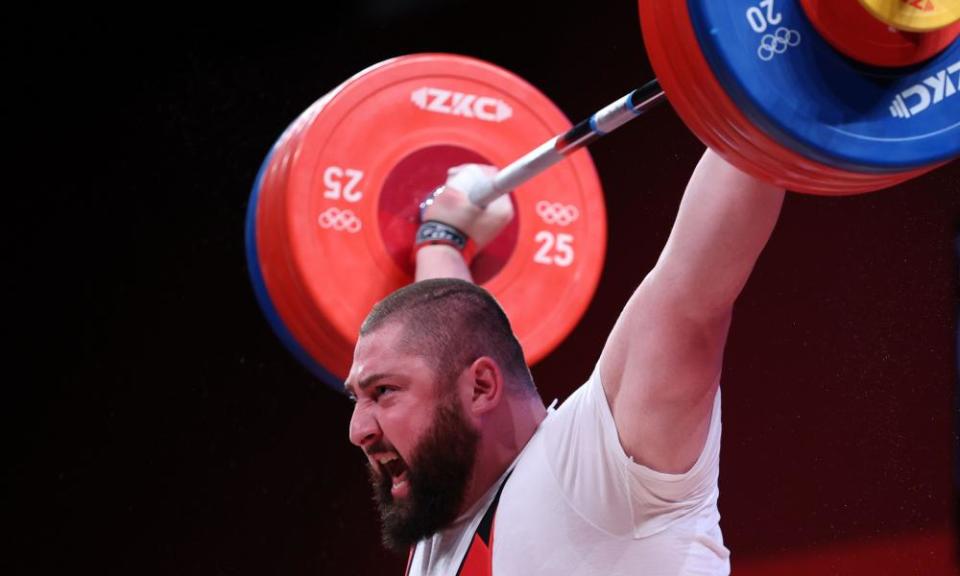Talakhadze dominates but is this weightlifting’s last Olympic heave?

In the British newspaper business we tend to measure heights in quantities of double-decker buses, and area in multiples of tennis courts and football pitches. Unfortunately, when it comes to weight there doesn’t seem to be an agreed international standard. This makes it tricky to convey exactly what Georgia’s Lasha Talakhadze did in the super-heavy division of the men’s weightlifting at the Tokyo International Forum on Wednesday evening, when he broke his own world record by lifting 488kg. That’s about the weight of an average dromedary camel. Or four Vespa scooters. Or 67 shot puts. Or 2,425 turnips. Take your pick.
Of course Talakhadze, 27, 6ft 6in and 27 stone, didn’t do it all at once. That would be ridiculous. No. He set one world record in the snatch (223kg, or the gold-medal winning crew in the men’s lightweight double sculls, and their boat and oars), and another in the clean-and-jerk (265kg, or one large upright piano). Next he says he’s planning to become the first man in history to lift a combined total of 500kg.
Related: Tokyo Olympics: Johnson-Thompson injured, De Grasse wins 200m, more GB golds – live!
Talakhadze, who won the gold in Rio 2016 too, isn’t really in a competition with anyone but himself at this point. He only comes out on stage when everyone else has finished lifting, the last of them invariably failing at a final weight well below the one he opens with. In the snatch the best anyone else managed was 200kg. Talakhadze started with 208kg. In the clean-and-jerk, his nearest competitor managed 241kg, while Talakhadze opened with 245kg. Still, for the record, Iran’s Ali Davoudi came second, and Syria’s Man Asaad third. That last one is worth noting – Syria’s first Olympic medal in 17 years.
“After 10 years of war, sanctions, and embargoes, we’re hoping this will bring people at home a little happiness,” said Naser Alsaeid, the secretary general of the Syrian Olympic Committee, “and that he can be an idol to other sportspeople in our country.” Asaad thanked God that he was able to bring them some joy. He said he felt they had been waiting for it.
So much for the good news. Whether anyone here, including Talakhadze, Davoudi or Asaad, will ever get to do any of this again is an open question. The International Olympic Committee has repeatedly threatened to throw the sport out of the Games after 125 years because of the size of its doping problem, and the systemic corruption at the International Weightlifting Federation, which the IWF is now trying to fix. The event is already shrinking. More than 100 quota places were taken away from countries who would have been competing here, as punishment for their bad track record in anti-doping. It’s fair to say that Talakhadze, who isn’t always the most enthusiastic conversationalist, warmed up when it was suggested that he might not be allowed to compete in Paris three years from now.
“I do not agree with those people who have such a bad view of weightlifting,” Talakhadze said. “In my opinion we need to punish all those people who are to blame and then of course weightlifting will stay in the Games.” He didn’t mention it but once upon a time Talakhadze was one of the people to blame himself. He served a two-year ban when he tested positive for stanozolol in 2013, which you might think makes him a slightly odd sort of pin-up boy for the sport. These days, he explained, his achievements are entirely down to his “coach and trainers who are giving me strength and proper direction”.
Talakhadze wasn’t the only man on the podium who had previous. Asaad served a year-long suspension when he tested positive for metandienone. “I want to tell the journalist who asked this question that my answer is that if there is no weightlifting in the Olympic Games, which sport will symbolise power and strength?” Asaad said. “It is an iconic competition, and it is an honest competition.” Then he flexed his bicep. The Czech Republic’s Jiri Orsag, who finished seventh, had also been banned for a year after a positive test for tamoxifen, so that meant three of the seven men in the final had a history they might not want to talk about.
There wasn’t much time to press any of them on this. The man hosting the press conference suggested that the one question about doping probably ought to be the last asked. Judging by the way Talakhadze kept shaking his head and crossing his hands in the front of his chest to make an “X”, he seemed to agree.

 Yahoo Finance
Yahoo Finance 